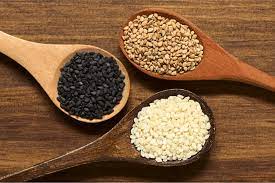Tahini, a paste made from sesame seeds, is rich in nutrients and fiber. It’s a good addition to your diet and helps maintain a healthy weight.
Tahini is often made from hull-removed white sesame seeds, but you can also use black sesame seeds to make this nut-rich spread.
Vitamin E
Black tahini is an excellent source of vitamin E and can be used in a variety of ways. For example, it can be added to soups and sauces for a healthy boost of antioxidants or used in place of butter or oil when cooking a meal.
However, it’s important to note that not all tahini contains the same amount of vitamin E or the same quality ingredients. Moreover, some contain oxalates, which can increase the risk of developing kidney stones and gout.
The best tahini is made with organic sesame seeds and are roasted to give them that extra boost of flavor. This is the best way to get a rich, nutty taste without any added sugar or salt. It also has a good amount of calcium and antioxidants. This is a great addition to any healthy diet. The most important thing to remember is that it must be used in moderation. For example, a cup of tahini is about as much as you should consume in one sitting.
Antioxidants
Black sesame seeds are an excellent source of antioxidants, which can help protect the body against cell damage caused by oxidative stress. Oxidative stress can lead to a variety of chronic conditions, including cancer, heart disease, and diabetes.
Antioxidants are also key to maintaining good skin health and helping fight inflammation in the body. Sesame seeds are high in phytosterols, which are plant compounds that can reduce cholesterol levels and support a healthy immune system.
Tahini is a versatile paste made from hulled sesame seeds that are ground into a smooth spread. It’s a healthier alternative to butter, mayonnaise and cream-based sauces, and can be used to add non-dairy creaminess to soups, salad dressings and smoothies. It also makes a tasty spread for breads, crackers or even falafel. For a sweet finish, try it with honey or maple syrup. You can also sprinkle it over fruit or swirl it into brownies and cookies. You can make tahini at home by blending sesame seeds with oil and a bit of salt until smooth.
Calcium
Black sesame seeds, which are ground to make tahini, offer a rich source of calcium. In fact, a tablespoon of tahini contains more than twice the amount of calcium that can be found in one glass of milk, and it offers a good dose of protein as well.
In addition to the aforementioned nutrients, tahini also offers heart-healthy monounsaturated fats, antioxidants and several vitamins and minerals. It’s a great substitute for dairy in the diet and helps fill you up without adding too many calories or extra carbs.
It’s also an excellent source of copper, zinc, iron, manganese, amino acids, and omega 3 and 6 oils. These nutrients are known for their anti-inflammatory properties and help support cardiovascular health, immune function and healthy skin.
Fiber
Tahini is a versatile spread made from ground sesame seeds that can be used as a condiment or in savory dishes. It’s also a great substitute for dairy-based sauces and dressings.
It’s high in fiber, too, providing a filling source of protein and fat that helps you feel fuller between meals. That’s important for appetite control and weight loss.
In addition to its fiber, tahini is a healthy plant-based source of iron, potassium and calcium. Plus, it’s a rich source of antioxidants and phytosterols.
You can make your own tahini at home with just a few simple ingredients. It’s quick and easy to do, plus it’s shelf-stable.
Try blending it into your morning smoothie to add flavor and nutrition to your breakfast. Or mix it with honey and cinnamon for a sweet-and-savory spread that you can top bagels, English muffins or toast with. Or drizzle it on roasted vegetables, like cauliflower or eggplant.
